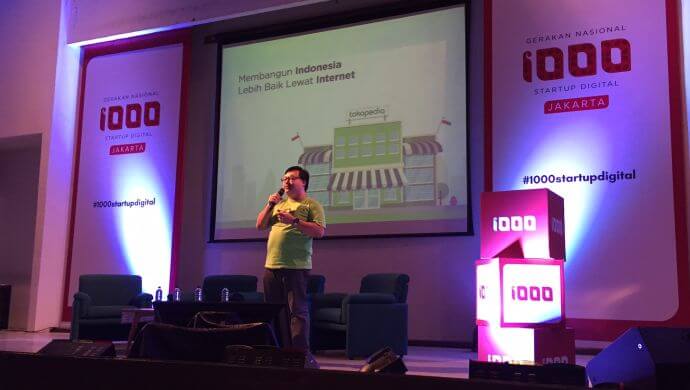Jakarta saw the first phase of the 1000 Startup movement held last weekend, gearing up participants for the nation-wide event

Tokopedia co-founder Leontinus Alpha Edison presenting his keynote speech
There are many reasons why one would build a startup, but according to the speakers at the Gerakan Nasional 1000 Startup Digital (1000 Startup) Ignition event on Saturday, July 30, the focus should be on providing a solution to an existing problem in the society.
“[Working in Go-Jek means] I don’t just work for my boss. I am working for hundreds of thousands of people out there,” said Alamanda Shantika, head of Go-Jek’s People’s Journey division.
Credited as the person who developed the Go-Jek app, Shantika explained how she built the company’s products by taking inspiration from small, everyday problems.
While the Go-Jek prepares a road map at the beginning of each year, the implementation tends to change along the way, following the company’s massive and often unprecedented growth. Take for example the development of Go-Food and Go-Mart, which are considered as Go-Jek top products.
“I was at a friend’s house and I have no idea where the nearest supermarket is. I told Nadiem [Makarim, Go-Jek CEO], “Why don’t we create a list of supermarkets and restaurants? And what if we also add a menu to the restaurant list?” she said.
The event also saw the presence of Tokopedia co-founder Leontinus Alpha Edison.
“For big companies with abundant of resources, it is easy for them to do this and that. So we want to help the smaller businesses, those with no knowledge in creating, let alone maintaining, a website. Those with no connection to banks,” he said, explaining the reason why Tokopedia was first built.
“And throughout our journey, we always find new problems to solve,” he added.
How does one determine the most suitable solution to a problem?
“William [Tanuwijaya, Tokopedia CEO] and I are both active members of the KafeGaul forum back then, so we experience the pain [of doing unsafe online transaction] first hand … We are part of the community that we aim to help, so we know exactly what they want,” explained Edison.
Also Read: This is the Indonesian healthtech startup that President Joko Widodo has been talking about
Another session discussed why founders need to be mentally strong when building their startups.
“Especially in Indonesia where the ecosystem is not that strong yet,” said Diajeng Lestari, CEO of HijUp.
Dian Kosasih, Founder of Makedonia, also mentioned the four qualities that founders need to have — critical thinking, creativity, collaboration, and communication.
“We need to be able to conduct research to solve a problem, and we also need to collaborate as no one is able to save the world by himself. Also, if you have a good idea, a good product, but you aren’t able to sell it, then it’ll be pointless. Founders also need to be active at the grass root level, mingling with the society,” she elaborated further.
She also mentioned that two of the biggest mistakes founders often commit are: Not being serious enough (about the work), and not having enough fun (doing the work).
“They’re talking about solving a problem, but all the data that they have is gathered only through desktop research. As for the fun itself, there is no need to go out to far away places. Just go to the nearest parks and watch how street food vendors do their work,” she said.
Also Read: Bukalapak CEO receives prestigious award from Indonesian President Joko Widodo
The 1000 Startup movement is initiated by the Ministry of Communications and Informatics and KIBAR to produce 1,000 local startups that will contribute to the development of Indonesia’s digital industry by solving major challenges faced by the nation today, from agriculture to SMEs.
The movement will be held in four main stages –Ignition, Workshop, Hackathon, and Incubation– with the Saturday event marking the start of Ignition stage in Jakarta. It will be followed by similar events in other cities.
“To give birth to 1,000 digital startups, we implement the strategy of intensive mentoring and coaching through systematic stages in the first 10 cities with strong digital infrastructure and foundation,” said Yansen Kamto, Chief Executive of KIBAR.
KIBAR claimed that 200 participants attended the event. They were selected from about 4,000 applicants who submitted their pitches to the committee.
The post Tokopedia co-founder: We always find new problems to solve appeared first on e27.